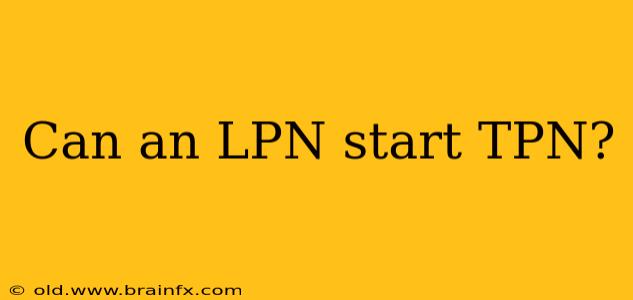The question of whether a Licensed Practical Nurse (LPN) can start Total Parenteral Nutrition (TPN) is complex and depends heavily on several factors, primarily the specific state's nurse practice act, the hospital's policies and procedures, and the LPN's individual training and competency. There's no blanket "yes" or "no" answer.
Understanding TPN and its Administration
TPN is a complex and potentially risky procedure involving the intravenous administration of a hypertonic solution containing nutrients. It's used when a patient cannot receive adequate nutrition through the gastrointestinal tract. Starting TPN requires meticulous attention to detail, including:
- Accurate calculation of nutrient requirements: This necessitates a deep understanding of patient physiology and nutritional needs.
- Preparation of the TPN solution: This often involves sterile compounding techniques to prevent contamination and infection.
- Insertion and maintenance of a central venous catheter: This requires advanced knowledge of vascular access and meticulous aseptic technique.
- Close monitoring of the patient: Regular blood tests, monitoring of fluid balance, and vigilant observation for signs of complications are crucial.
These aspects highlight the need for a high level of training and expertise.
State Nurse Practice Acts and Scope of Practice
Each state's Nurse Practice Act defines the scope of practice for LPNs. These acts vary significantly. While some states might allow LPNs to administer TPN under the direct supervision of a physician or registered nurse (RN), many others explicitly prohibit it. LPNs typically have a more limited scope of practice than RNs, and the complexity of TPN administration frequently falls outside their permitted activities. To determine the legality in a specific location, it's essential to consult the state's Nurse Practice Act directly.
Hospital Policies and Procedures
Even in states where LPNs might legally participate in aspects of TPN administration, individual hospitals maintain their internal policies and procedures. These policies dictate the roles and responsibilities of different healthcare professionals, including LPNs. A hospital may choose to restrict TPN administration exclusively to RNs or other advanced practice providers, regardless of the state's nurse practice act.
Training and Competency
Regardless of legal allowances or hospital policies, an LPN's ability to start TPN is also contingent on their training and demonstrated competency. Adequate training in sterile compounding, intravenous therapy, and the specific requirements of TPN administration is mandatory. The hospital will have specific competency assessments to ensure that an LPN possesses the required skills before allowing them to participate in any aspect of TPN management.
Conclusion: It's Highly Unlikely
In most scenarios, the answer to the question "Can an LPN start TPN?" is no. The complexity of TPN, combined with the typical scope of practice for LPNs and common hospital policies, usually designates this task to RNs or other specialized healthcare professionals. While state regulations and hospital policies can vary, the high risk associated with TPN administration usually necessitates the expertise of a nurse with a more extensive scope of practice. Always check with your state's board of nursing and your employing facility for the most accurate and up-to-date information.

